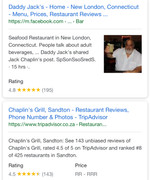roadfix
Chef Extraordinaire
Assuming this guy took the safety precautions knowing he was on camera, can you imagine what he does off camera?
I use a board made from a solid block of unfinished hardwood which was given as a gift on my 21st birthday (I happen to know that it cost an arm and several legs but it's served me for nearly 50 years so it's probably just about earned its keep!!!). It's well scrubbed after use and stood on its end to air dry.
Wood is supposed to contain naturally occurring anti-bacterial properties and doesn't blunt your knives like glass, plastic and other synthetic ones do. I wouldn't trust the synthetic boards which are supposed to be anti-bug (sorry, can't remember the word I'm fishing for!) further than I could throw them. To be on the safe side I use one side of my board for meat, poultry, fish, etc., and the other for everything else. I also chop veg, etc., first and then the meat last, to be on the safe side.
That's not a fair statement. You may have worked in a few dirty ones but that's not enough to make that assessment..I know many that are very clean. My place always gets excellent inspections, I make sure of it..maybe you should spend a few bucks and eat at a good one..

Makes me glad my quests don't watch me cook..
5 SECOND RULE!!!! 5 SECOND RULE!!!
Ross
I can evwnvsee 10th century vikings saying, "Oh my Odin, Helga. That'sa pretty nasty, don't you think?"

I do this too. Remember though, good hot water, 100 degrees F is a great temperature to grow bacteria and there is no way around it besides changing the water often. (I read an article lately that said hand washing dishes should have water at 170 deg F--which isn't going to happen at my house. My water heater is set to 120 deg F.)All of this is really never an issue when I cook because I always have one half of the sink filled with hot soapy water and I wash my hands and my utensils as I go, keeping the chances of contamination as small as possible.

We, absolutely understand that.. This was in 1984..Current official food safety advice is NOT to wash/rinse poultry before cooking because it can spread contamination in the kitchen. Cooking the bird properly is supposedly sufficient to kill nasties.
More important is to thaw a frozen bird completely before starting to cook it (despite the instructions in the booklet that came with my table top halogen oven!).
I do this too. Remember though, good hot water, 100 degrees F is a great temperature to grow bacteria and there is no way around it besides changing the water often. (I read an article lately that said hand washing dishes should have water at 170 deg F--which isn't going to happen at my house. My water heater is set to 120 deg F.)
The detergent in dishwater is itself antibiotic, so I don't worry too much about it being a culture medium. I don't leave it all day, generally only for an hour or two at most to keep ahead of the mess when I'm cooking. I usually fill the sink with straight hot tap water, too hot to put your hands in for more than a couple of seconds. By the time it cools to lukewarm, it needs to be replaced, simply because it won't properly emulsify grease any more at that point.
Rick, I know you know better than to drop knives in that water.
I'm not ocd, but I am conscious of germs so I regularly wash my hands, our kitchen table is close in the kitchen, so my family are normally at the table when I'm cooking, so I'm aware I need to be clean and germ free. It's a bit like chicken, when you cook it. It has to be cooked right.
Russ
